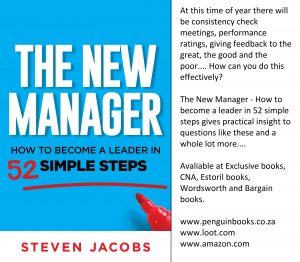
 Aug 20th 2016 – Amazon
Aug 20th 2016 – Amazon
5.0 out of 5 Stars – Must read for managers both old and new.
“Capturing the imagination of your audience through personal lessons and the willingness to share both the achievements and failures alike makes this an must have for all mangers”.
Aug 30th 2016 – FIN 24
“In the introduction, Jacobs explains: “Now the big day has arrived (you have been appointed team leader,) you know the job, you know what has to be done, and you want to make a good impression. It’s a step into the unknown, but (this book,) The New Manager will be your mentor 24/7.” Having read the book carefully, I already have a list of people I am going to recommend it to. Included are members of my family, new managers in companies I am invested in, and client companies.
Jacobs has produced a valuable book – use it if you are at the beginning of your career, or share it with those who are”.
* Ian Mann of Gateways consults internationally on leadership and strategy and is the author of Strategy that Works. Views expressed are his own.
http://www.fin24.com/Opinion/book-review-how-to-build-a-dream-team-20160830
Available at:
Exclusive books, Estoril Books, Bargain Books, Wordsworth and CNA
www.loot.com; www.amazon.com; http://www.penguinrandomhouse.co.za
I have searched for data but have not been successful yet on determining how many people in the world are promoted daily into managerial positions. My gut feel is that the number would be in its thousands if not in its tens of thousands. Every one of these newly appointed managers is going to need some guidance yet I wonder how many will ask for it?
When I was appointed into my first managerial position I don’t think I asked for help either. I mean I had led people before at school and in my church so how hard could it be? Boy was it easy when things were going right but when things went wrong, they went horribly wrong. Nothing had truly prepared me and I can be honest and say that I definitely made many mistakes, some of which had a definite impact on my financial wellness. Yet who could I speak to? Who could have prepared me for what I was to face?
Over the years I have loved raising up young new leaders in the workplace. It has been a privilege to be part of their leadership journey. In Ghana I would try and share my experiences as much as possible with these leaders to give them a head start as they did not need to go around the same mountains I did. Some of them heeded the advice and have done exceptionally well and others… well others have just continued on their own walk in their own way making their own repetitive mistakes.
Whilst in Ghana I knew I was going to head back to South Africa and there were two very clear projects that I had to complete. One was to finish a financial planning diploma that I had dropped out of many years before and the other was to finish writing my book I had spoken about for so many years of my life. I am pleased to say that I did finish both and have now got my eyes on a new goal. The book is a book I am proud of. Not in an arrogant way but more that I believe in it. I recently received an independent review from Ian Mann and he totally understood the value of the book and how it could help the New Manager, in fact I was deeply humbled to read that he was going to recommend it to family members. That blew me away.
The book will definitely help “any” first time manager or someone aspiring to become a manager. Why do I say this? I say this because I have written it as an “as is” book. The book tells it like it is. I share story after story of events that have taken place with me and others in leadership both the good and the bad so as to ensure that the reader is well prepared for their own journey ahead.
My greatest challenge right now is not whether people like the book or not. My greatest challenge is this “How do I ensure every new manager or someone aspiring to be a manager” knows about my book? This is the greatest challenge as so much of what we see is a fraction of what we are able to truly see. The internet is manipulated by the size of the wallet. Companies pay massive sums to ensure they come up first on search engines and news feeds. I know my book can help people but without your help my book will never get into the hands of those that need it most.
Please help in the quest to get “The New Manager” known by telling your training and HR partners about it or any new manager you know.
God bless
The New Manager: How to become a leader in 52 simple steps, by Steven Jacobs
TWO colleagues walked past my desk as I was reading this week. When they asked what I reading, I told them it was a primer for managers and one said: “You must be so bored reading another one!” I explained that this was for a first-time manager, someone appointed to be a team leader of a group in a call centre, for example.
One colleague responded: “I wasn’t given any advice when I got my first position, I didn’t have a clue what I should do!” This began the conversation between the two women, one of whom retired as a mainboard director of a top 100 listed company, while the other had worked in and on multinationals, internationally. Both saw the enormous value in Jacob’s no-frills, down-on-the-floor, real guidance for first-time managers.
The book is a collection of 52 pieces of advice and insights, each a three-page chapter with “Reflection Questions” at the end. The topics range from how to gain credibility and bond with your team, to how to lead in the storm. It covers how to develop your people, manage their performance, and evaluate your own performance.
The book opens with the issues one could face in the first three months of this new role. On Jacobs’ first appointment, a team member confronted him sternly, saying: “Steven, I want you to know, I don’t like you.” Pause here, and consider what to do in this situation. You are young and thought you were appointed because everyone loves you.
His response: “I am sorry you feel that way; it’s okay that you don’t like me. You don’t need to like me, but going forward I would like your commitment that you will deliver on your business objectives. I commit to this, too.” This is an important lesson; not everyone will applaud your appointment and handling this well will set the right tone for your tenure.
It leads directly into the next key issue: knowing as much as you can about the people you work with and their personal circumstances. With this knowledge, can you answer the main question: Why have I been appointed? The only answer is – to develop each person, and the team as a whole.
‘Control freak’ behaviour
The appointment to a leadership role is so often mistaken as being a reward for hard and competent work, with the right to relax into “the boss” position. This is a trap. What earned you the leadership position was your diligence, ability and hard work. That is exactly what you are being expected to continue exhibiting. Misunderstanding this expectation leads to arrogance, ‘control freak’ behaviour, and the popularity drive of a campaigning politician.
In everyone’s life there are people you love and who love you, with the inevitable result – a high level of commitment. The “love” of your staff required in the workplace is essentially the same: “the unselfishly loyal and benevolent concern for the good of another” (Merriam-Webster’s definition).
A leader who really loves her team will correct them (in their best interests) and help them succeed. The true measure of leadership is not how many promotions you have received, but how much your people grow through your guidance, Jacobs points out. That is real caring, and “If your team really knows that you love them, they’ll go the extra mile,” Jacobs notes.
Inevitably, things will go wrong in business – conditions over which the leader has no control will turn unfavourably. It is at times like this that good leaders excel and bad ones fail. If the leader shows panic, how can he possibly lead the team out of trouble?
Good leadership requires that the leader appears to calmly lead the team out of the storm, despite what he is feeling inside. Being “authentic” and letting one’s fears be exposed is hardly the hallmark of good leadership. “No matter how you feel,” Jacobs exhorts, “when you walk through those doors and others see you, be positive!”
Team leaders are often required to judge people, and not fully knowing the situation can lead to painful mistakes. Without watching the entire movie, it is impossible to accurately predict the ending, and it is no different in the workplace. You need to know the whole story before coming to a conclusion.
Being biased by a relationship you have with one party can result in a grossly unfair decision for the other party. Overriding this bias and displaying wise leadership will have your team trust you, knowing you are fair in all situations, no matter who is involved.
No one can be a leader if they cannot be a follower. “When leaders respectfully follow the ones above them, they set an example for others to copy,” says Jacobs. Too many people believe they are more competent than their manager, but if your team is aware of this, you are setting a poor example for them.
Leaders clearly cover the full range from the inspiringly competent and caring, to the exact opposite. However, in the interests of one’s own team, the leader needs to always show respect for their manager’s position, irrespective of the manner in which they lead.
In the introduction, Jacobs explains: “Now the big day has arrived (you have been appointed team leader,) you know the job, you know what has to be done, and you want to make a good impression. It’s a step into the unknown, but (this book,) The New Manager will be your mentor 24/7.” Having read the book carefully, I already have a list of people I am going to recommend it to. Included are members of my family, new managers in companies I am invested in, and client companies.
Jacobs has produced a valuable book – use it if you are at the beginning of your career, or share it with those who are.
Readability: Light +—- Serious
Insights: High –+– Low
Practical: High -+— Low
* Ian Mann of Gateways consults internationally on leadership and strategy and is the author of Strategy that Works. Views expressed are his own.
http://www.fin24.com/Opinion/book-review-how-to-build-a-dream-team-20160830
